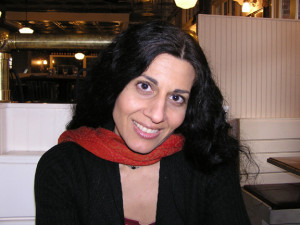Joan Hanna: We were so happy to have “Elixir in Exile” for our July/Asia issue. This mysterious elixir created such a palatable backdrop for your story. Can you share more about your fascination for the elixir and how it held a connection to your childhood?
Lucine Kasbarian: Thank you for the opportunity to share an authentic tale pertaining to Armenia — a region of the celebrated Silk Road. Growing up in New Jersey, I witnessed my father’s thrilling storytelling – at family gatherings, dinner parties, and especially when relaying bedtime stories to me. He came from a family of storytellers and would regale me with tales about super-humans, talking animals and tevs (spirits) from our Armenian folklore. As he recalled what he knew about Iskiri Hayat – the mysterious elixir — a dreamy look would come over him. When I inhaled the fragrance of the elixir myself, it further stirred my imagination. The sensation took me to the far reaches of the earth. Even the elixir’s name had a faraway, magical sound. It represented unknown enchantments that can come from a place beyond one’s grasp.
JH: Can you talk about the Armenian Genocide that you referred to in your story?
LK: The Armenian people — whose nation was the first to adopt Christianity as its state religion in 301 AD—were native to what is present-day Turkey for more than 3,000 years. However, they became an occupied nation following Turkic invasions in the 11th century. Although indigenous, as Christians Armenians were considered second-class citizens by their oppressors, and their human rights steadily declined and culminated in outright massacre by Turkey beginning in the 1800s. Their pleas for equal rights and even autonomy were met with a premeditated, state-sponsored genocidal plan which sought to eliminate the Ottoman Turkish Empire of non-Turks, including not only Armenians but Christian Assyrians and Greeks. The result was a combination of torture and massacre for adult men; torture, rape and abduction into harems, and forced conversions for select women and children; and torture, murder and deportations — also known as death marches — for the remaining Armenians. Although more than 1 ½ million Armenians, ¾ million Assyrians/Chaldeans and 1 million Greeks perished in the ordeals, today’s Turkish regime does not acknowledge the Genocide. And, there has yet to be restitution for these crimes against humanity.
JH: There are so many stories like this of lost family histories and broken branches of family trees. How do you think this heritage affects you as a writer?
LK: The adage “truth is stranger than fiction,” and the literary command to “write what you know,” apply here. In my lifetime alone, so many disastrous acts have gone unreported and remain unknown, which is why I prefer to write nonfiction. Moreover, those few writers who do report about the Armenian reality often get it wrong, intentionally or unintentionally.
I feel an obligation to tell our stories not only for posterity and truth but as a way to pay homage to peoples who suffered and sacrificed for the right to speak their language, honor their customs and practice their faith. We are nearing the 100th anniversary of this Genocide, and yet survivors and their descendants, like me, still live with sorrow and exile every day. How does one express the grief that one faces when contemplating the loss of a majestic and ancient culture? Today we still see such destruction happening in many countries. And around us are major world powers and stenographers posing as journalists who either tell us to forgive and forget, or themselves deny the truth to appease criminal regimes for the sake of political expediency. This is unacceptable. The world must press for restorative justice for all exploited, genocided and disenfranchised peoples, not just for peoples who as tokens may serve the interests of the powerful.

JH: Please share with our readers any links to your website, other publications, or published books.
LK: Gladly. Here’s a link to my website, and my article archive
My books can be found here:
Armenia: A Rugged Land, an Enduring People
The Armenian Americans (Consulting Editor)
JH: Again, we would like to thank you for sharing your story “Elixir in Exile” with r.kv.r.y. I have one final question: what does recovery mean to you?
LK: “Elixir in Exile” is about a quest to recover a remnant of our lost history and culture through an ancient folk remedy that represents “home.” The essay also conveys the hope of a greater possibility: that while the lost dead may not be recovered, homelands can.
Can one ever make a full recovery? Perhaps from injury in the physical sense, but in the emotional sense, after a devastating experience, survivors are “in recovery” for the rest of their lives. In fact, future generations of survivors’ descendants continue to feel the after-effects of such devastation because the perpetrators and their heirs have not been held to account. As the saying goes, “That which resists, persists.”


Pingback: Member Monday: Member Updates « Women's National Book Association – NYC
Thank you, Ms. Kasbarian, for articulating what so many of us feel but cannot put into words.
Pingback: “Elixir in Exile” by Lucine Kasbarian | Rkvry Quarterly Literary Journal